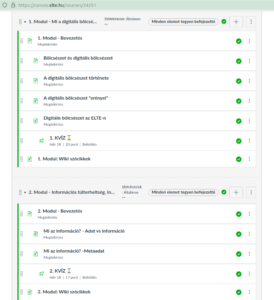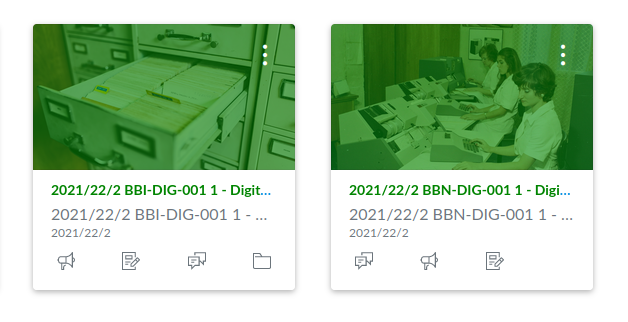Beginning from the 2019/2021 academic year, the subject, Competencies in Digital Humanities has been made mandatory for undergraduate students at the Eötvös Loránd University.
The course aims to provide students with a general overview concerning digital history, the use of various tools/services – that will be needed during the later part of their education at the university (e.g. Zotero, J store, Quizlet, etc.) – about digital cultural heritage as a specific field of research, and other topics related to digital culture.
The curriculum of the course has been compiled variously, often with examples drawn from fine arts, films, or pop culture, using both Hungarian and foreign scientific literature, and explanatory videos. Furthermore, the modules of the course contain quizzes and practical tasks to test the knowledge of students, ensuring that each of them follows the material carefully.
The course takes place online (eLearning), on the interface of Canvas, meaning that students carry out their studies “remotely”, not at a definite time and space. Compared to the previous semesters, the course has been modified from spring 2021/2022 to make it more student-friendly both for its structure and requirements.

Beginning from this semester, the course consists of 2 times 6 modules. Each module is made up of textual core material and related quizzes. Furthermore, for each module, practical tasks have been attached including check questions. To complete the course, students need to fill out all the quizzes, solve the practical tasks and answer the related questions.
Modules become accessible in pairs, two every second week. Beginning from this semester, the completion of all the modules is mandatory, but even those who should slip out of the two-week deadline have the opportunity to complete the module for less than fifty percent of the original score.
From the current semester, the course will be available in Hungarian and English.
Thematics:
- What is Digital Humanities?
Its definition, history, and its place between humanities in general and digital sciences. Research on digital humanities at Eötvös Loránd University.
- Information Overload, Information Management, Information Literacy
An overview of the most important concepts related to information literacy (data, information, metadata, hypertext).
- A Brief History of the Digital Medium
The making of the World Wide Web and an overview of its different types (1.0, 2.0, 3.0).
- How to find Appropriate Sources of Information?
Types of resources and difficulties in finding appropriate sources of information. Online repositories.
- Digital Science
The legal aspects of the usage of certain sources: copyright, plagiarism, and the related methods of digital humanities.
- Big Data and Smart Data
An overview of the technologies of Big Data and Smart Data.
- Born Digital Contents and Web Archiving
The differences between born-digital and analog contents. Preserving the past of the Web and the benefits of archiving it from time to time.
- What is Artificial Intelligence?
The definition of artificial intelligence, the history of its creation, and its relation to the human intellect.
- Digital Cultural Heritage
The concept and methods of digital cultural heritage.
- What is Network Theory?
An outline of the basic concepts of network theory (relations, nodes, edges). Network theory in the humanities (analyses in prosopography).
- The City and Digital Technology
What are smart cities? Geographic Information Systems. The heat map in the urban space. 3D modeling of cities and buildings. The impact of digital technologies on urban spaces.
- Natural Language Processing
The fundamentals of the stylistic analysis of language, the concept, and types of corpora, the annotation of corpora.
Contributors to the Course:
Editor-in-Chief: Gábor Palkó
Editor: Ádám Smrcz
Further Participants: Karabulut Aslihan, Veronika Szabó, Eszter Szlávich, Mária Timári, Gábor Oláh (Module 11), Patrik Mravik, Andrea Dömötör
2022.03.06.

